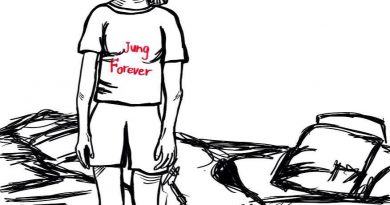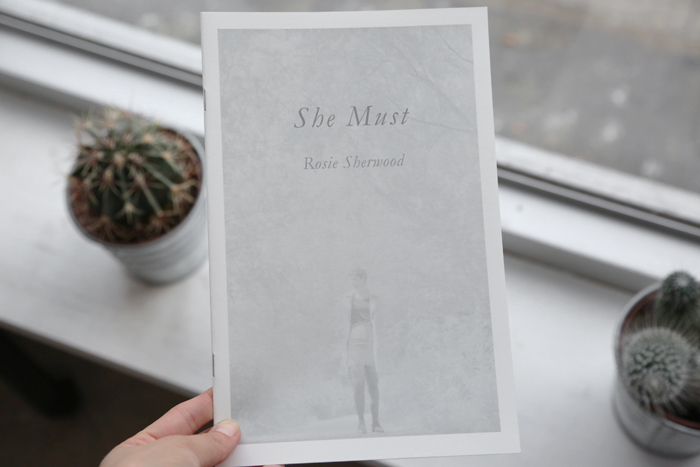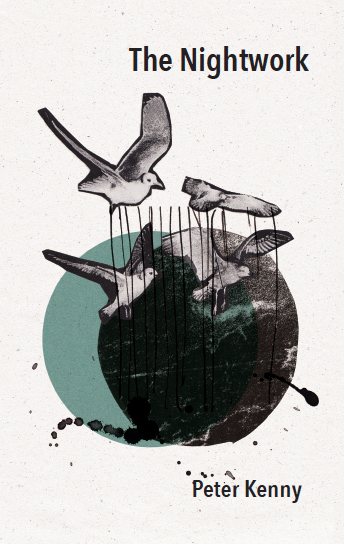Because I Can See Needing a Knife by Noah Stetzer
–Reviewed by Bethany W. Pope–
Every so often life brims over with terror. Your mother dies from an aneurysm, falling down and flattening her nose in the middle of the grocery store, while you were picking out a carton of yoghurt. Your dog slips its collar just in time to be struck by a truck that’s travelling too fast down a road it should never have been on. You come down with what you think is just a bad cold, some sickness you cannot shake, you go to the doctor expecting to receive antibiotics and instead they tell you that you’ve got cancer, or aids. Most people have a difficult time living through such events, they struggle simply to keep breathing, maintain the pulse which thrums through their veins. Some people are noble enough to take such news like a blow to the face, stare down the horror which assails them and transform it, blazing, into art. Noah Stetzer has done just that with his first pamphlet.
Because I Can See Needing A Knife centres on the daily struggle of living with a high virus-load of HIV. Its poems treat hospital stays, daily procedures, the indignity of peeing in public, the grief of parents, and the vast, unthought of, penalties of marital love. The tone of the poems is one of just-the-facts reporting. There is no hysteria here, no torn-cloth wailing (this in keeping with much writing by the shocked victims of trauma) just a slightly mournful laying out of the things which have happened.
This artful reportage flourishes in ‘Signals’, a poem which explores the indignity of trying to use the toilet while trapped in intensive care. The reader is presented with a careful catalogue of descriptions, delineating the herculean task of using a portable urinal:
Wobbly on your feet, this is careful work, a spilling
hazard and circus feat with siphoning chest tubes
strung up to the wall and down to the floor,
and IV drips fastened from your wrists to the rack;
a web of wires stuck with epoxy onto your hairy
chest sending signals down the hall. You’re what’s on TV
tonight at the nurses’ station
There’s no self pity, here, no lamenting. This is the sort of task that life, the hot, murderous thing we all cling to, requires of the speaker now. The reason for the struggle, and the consequences of victory, are laid out in lines that have been delicately polished to appear so plain:
You are standing in the dark because your body
won’t let you pee lying down. Like a high
wire walker you have climbed carefully down from the bed,
each cord and tube accounted for, your breath’s now
a little short, the jug in one hand the other gripping
the rail when all the lights flash on and the nurses rush in.
The narrative of the pamphlet follows the speaker in and out of hospital, fighting an enemy who attacks in unceasing waves. ‘Dusting’ takes place in an interlude while the tide is out. In this poem, the speaker is taking the dog he adopted with his husband to a vet for a second opinion, in the hopes of overturning a cancer diagnosis. The undercurrent of the poem is an awareness of how terrible it would be for the husband to suffer the death of his spouse and his dog in one turn of the calendar. The poem is formally very interesting. The lines are easily three times too long to fit onto an ordinary page, and so this leaf of the book is folded over down the centre. Once opened, the pain sprawled, understated and infinite, the poem creates an inescapable landscape of loss:
I call you from the car with the second opinion & that maybe four weeks at best but he’s comfortable & who knows, miracles can happen
& I explain that we’ll give him his pills & that we’ll watch for the terrible signs the nice vet listed & we laugh too hard at words like cancer
& say “I’ll see you at home.” Wipers too fast and the heat up too high, I keep careful car-lengths & make my turns slow;
I imagine I’m learning what you already know,
about an awful kind of waiting, cause we both know you’re the driver & I am the dog.
As a reader and a reviewer, I have blazed my way through over fifty pamphlets in the last year. This was the only one which brought me to tears. It takes self-control, a delicate hand, and unflinching bravery to write your way through trauma and to make that writing art. Noah Stetzer has more than managed it. Pick this pamphlet up.





